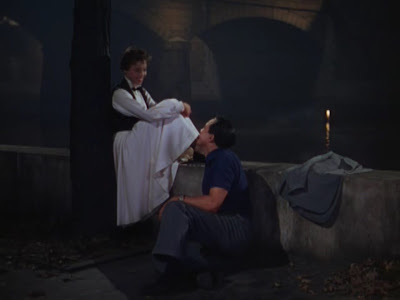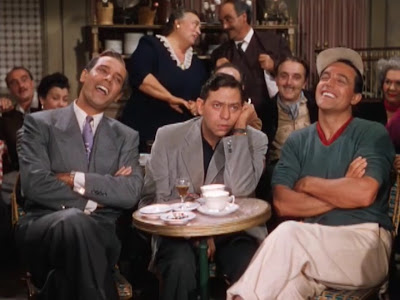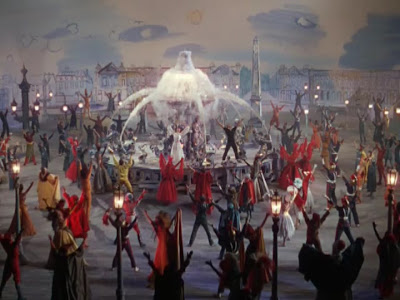 |
| American painter Jerry (Gene Kelly) falls for pretty Frenchwoman Lise (Leslie Caron) in Paris. |
Release Date: Oct. 4, 1951. Running Time: 113 minutes. Screenplay: Alan Jay Lerner. Producer: Arthur Freed. Director: Vincente Minnelli.
THE PLOT:
Jerry Mulligan (Gene Kelly) is an ex-serviceman who stayed in Paris after the war to become a painter. He has no money and no realistic prospect of success, but he's popular within his neighborhood and has a friend in a fellow American, would-be concert pianist Adam (Oscar Levant).
One day, the unthinkable happens: Jerry makes a sale. Milo (Nina Foch), a wealthy American woman, purchases two his paintings, then presents him with a proposition to sponsor his work and even arrange for a showing. He makes clear that he has no interest in being a "kept man," and she denies wanting that - but her attraction is clear, leaving him feeling uncomfortable even as he agrees.
Then he meets Lise (Leslie Caron), a young Frenchwoman, and is instantly smitten. After some initial resistance, Lise begins to return his feelings. But she is also engaged to Henri Baurel (Georges Guétary), a French showman to whom she feels indebted; and she announces that despite her feelings, she intends to marry Henri and never see Jerry again!
 |
| Jerry seeks advice from Henri (Georges Guétary), Lise's fiancé, while Adam (Oscar Levant) wishes he was anywhere else. |
CHARACTERS:
Jerry Mulligan: Gene Kelly as Gene Kelly, only this time with paintings. If that sounds snarky... Well, I can't really help it when there's nothing to the character beyond "paints" and "dances a lot." Gene Kelly was a good actor, but he was a genuinely great dancer. It's in the dancing scenes that he becomes interesting to watch, particularly an extended final ballet in which Jerry expresses all of his emotions across the entire picture. Here, where he doesn't speak, he actually feels more fully realized than at any previous point in the movie.
Lise Bouvier: Leslie Caron made her screen debut as Lise. Her dancing is impeccable, and her acting is perfectly fine. Unfortunately, Lise has even less depth as a character than Jerry does. Her best scene sees her explaining her reasons for staying with Henri: He protected her during the war, hiding her after her parents were killed at great risk to herself. Outside of that moment, however, she's mostly presented as a pretty but pretty blank slate.
Adam Cook: With bland leads, it's left to Oscar Levant to provide some entertainment value during the "talking" scenes. In a movie filled with surface-level characters, Levant's Adam actually feels layered and lived-in as a person. He brings equal parts anger, brilliance, and just plain bone weariness to his performance. He's also quite funny. There's a scene in which Jerry asks Henri for romantic advice. Neither of them realizes that they're rivals for the same woman - but Adam knows, and Levant's reactions during this conversation are priceless.
He is also at the center of what I think is the film's most mesmerizing musical number: An orchestral performance of Gershwin's Concerto in F in which he conducts, plays every instrument, and even applauds from the audience at the end of the piece. It's an absolutely hypnotic four minutes of film - and from what I can gather, Levant genuinely played every instrument in the scene (big credit also to the editors for putting that scene together).
Henri "Hank" Baurel: The third spoke of the romantic triangle, Georges Guétary's Henri is a thoroughly decent man... and that's really all there is to say about him. There's a sense that, because he is such a good man, neither Jerry nor Lise fight for their relationship in quite the way they might if he was a cad, but not much is done with that until the very end.
Milo Roberts: Nina Foch presents an attractive and intelligent screen presence as the wealthy woman who becomes Jerry's patron. I was all set to make a crack about how 28 year old Foch is apparently "too old" for 40 year old Kelly, but the film avoids that. Jerry's not interested in her for various reasons, at least one of which seems to be that the power imbalance tilts toward her instead of him, but age is never mentioned as an issue.
 |
| The wealthy Milo (Nina Foch) has an interest in Jerry's work - and a bit too much interest in Jerry himself. |
THOUGHTS:
The Hollywood musical is not my genre, which makes this a tricky film to review. I wasn't particularly taken with An American in Paris, with its slight story and shallow characters. At the same time, it is a fine representation of its genre, with some splendid musical sequences. It's a good movie, of its type; but it's a movie of a type that holds very little appeal to me.
Even accounting for my biases, I don't think it deserved the Best Picture Oscar. 1951 saw some outstanding motion pictures: John Huston's The African Queen, Alfred Hitchcock's Strangers on a Train, Elia Kazan's A Streetcar Named Desire, and Robert Wise's The Day the Earth Stood Still were just a handful of legitimate classics released that year. Compared to any of those, An American in Paris feels a bit... fluffy, mild, and really rather slow paced.
All of that said, there is much to admire here. Director Vincente Minnelli makes a wise choice with the musical numbers: He avoid close-ups, keeping the camera back to show off Gene Kelly's footwork. An early scene sees Kelly performing a callback number with Parisian children, and he alters his dance style with each new iteration. It's technically impressive as a dance scene, and it's also legitimately charming.
It's instantly obvious, at least to modern eyes, that this movie was not shot on location. When Kelly's opening narration moves from stock footage of Paris to "...Here's my street," I couldn't help but call back: "Here's the studio backlot." Still, some of the recreated locations work well. Kelly and Caron dance in the shadow of the Pont de l'Archeveche. You can see that it's a backdrop, but it's a good one, with the joins nicely disguised by the nighttime setting.
The movie's most famous set piece is an extended ballet that takes place inside Jerry's mind. This takes up most of the last twenty minutes, and it vies with the Oscar Levant concerto for the movie's most purely artistic sequence. Essentially, Jerry's entire journey (such as it is) gets recreated in dance against deliberately artificial backdrops. Full advantage is taken of the color photography, with vivid imagery throughout. The whole sequence is beautiful; and for all the hand-drawn backdrops and mannequin extras, it feels more authentically emotional than most of the rest of the movie. I suspect it was this sequence that won the film its awards, as it would stand as an excellent short subject in its own right.
 |
| A ballet in a dream world: Probably the scene that won this film its awards. |
REMAKES AND RETELLINGS:
Though there is no direct film or television remake, this musical has been adapted to stage. This doesn't surprise me in the least - though it is surprising that it took until 2008 for it to happen! The 2008 stage version was adapted by Ken Ludwig - though it was still later, in 2014, that an entirely different adaptation would gain notable stage success. Also, director Damien Chazelle has acknowledged that he "pillaged" the final ballet for the epilogue of his own 2016 musical, La La Land.
OVERALL:
It's difficult for me to properly assign a score to An American in Paris. I can appreciate that it's a well-made movie, and that it is good within its genre. At the same time, it's a genre that has never much spoken to me. While a few individual sequences captured my attention, I was mostly left cold.
In the end, the characters and story are just too thin to make up for my lack of appreciation for Hollywood musicals. If you are a fan of this type of movie, you should mentally add at least two points to my score. The movie isn't bad; it's quite well-made; but it just isn't my kind of film.
Overall Rating: 5/10.
Best Motion Picture - 1950: All About Eve
Best Motion Picture - 1952: The Greatest Show on Earth
Review Index
To receive new review updates, follow me:
On BlueSky:
On Threads:


No comments:
Post a Comment